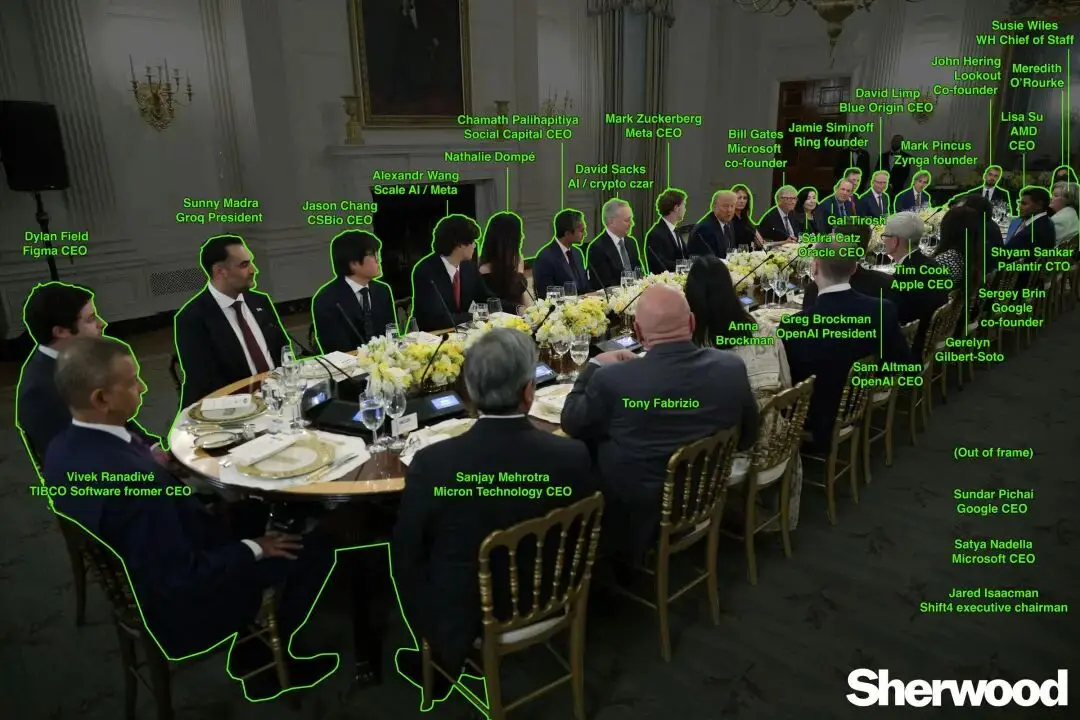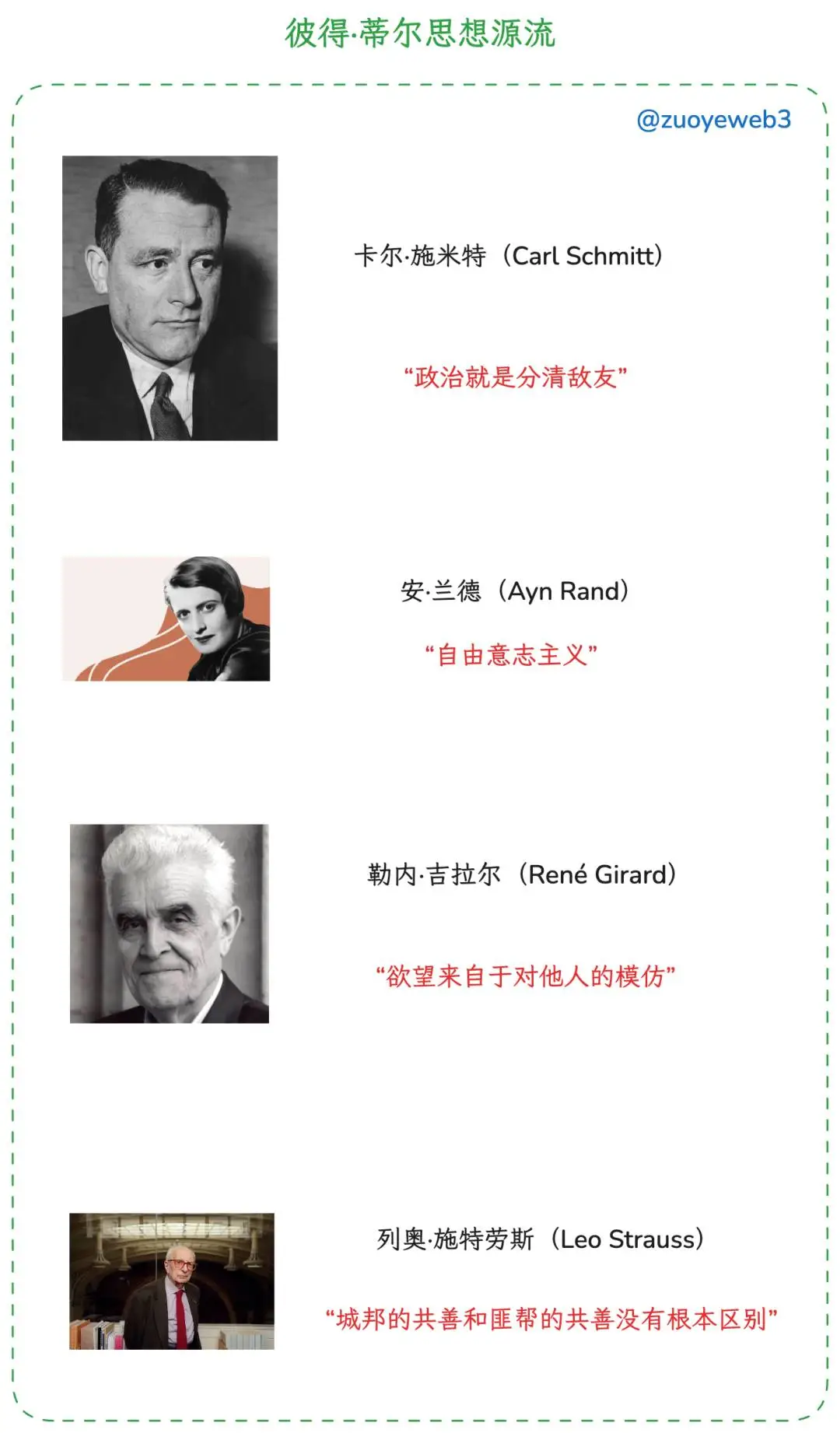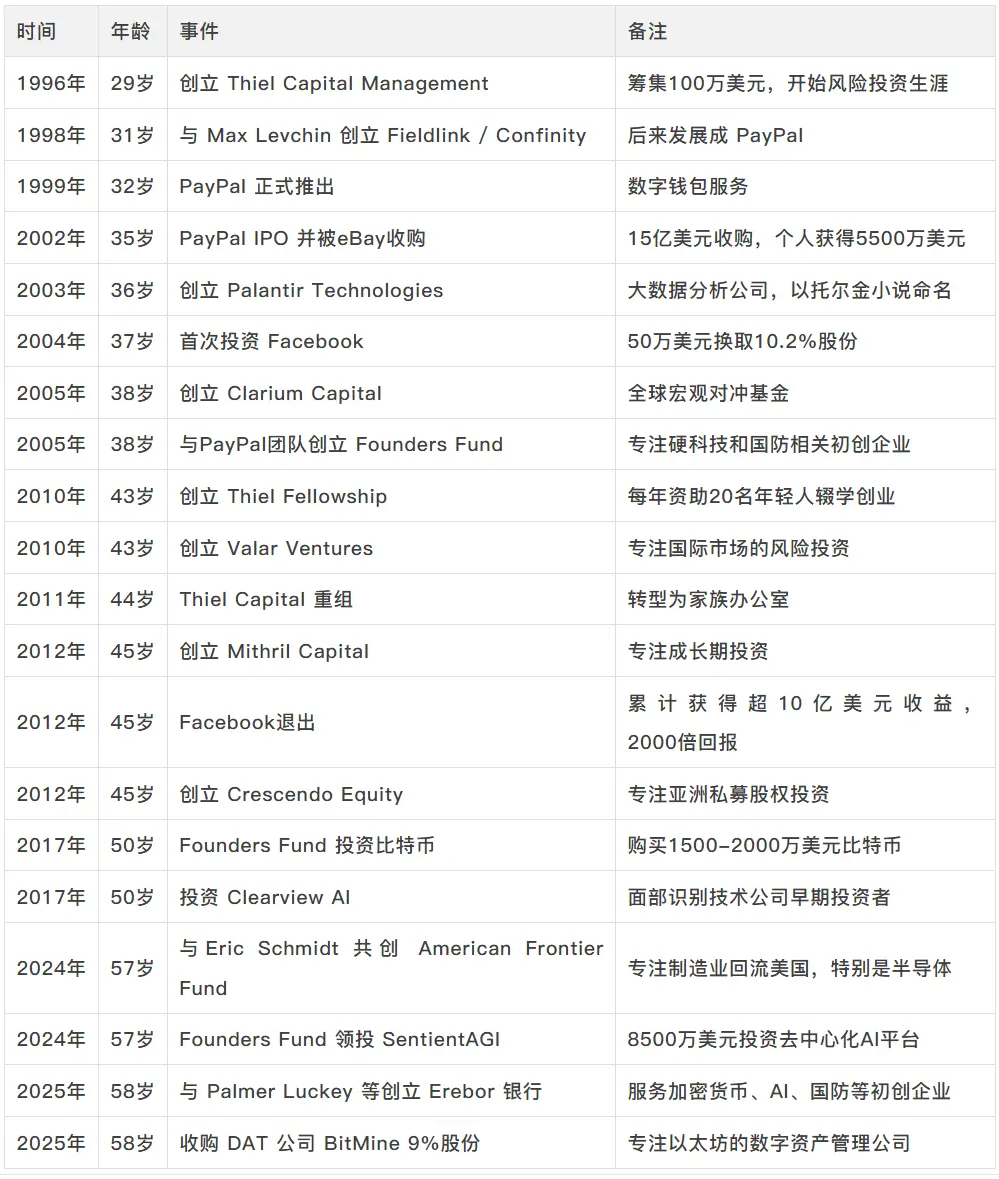Written by: Zuoye Waiboshan
On September 4th, at the White House technology conference, a number of Silicon Valley giants sat at the round table, but Peter Thiel was absent.
From left to right, Figma CEO is a Thiel Scholar, Scale AI is a unicorn nurtured by Founders Fund, David Sacks, in addition to being the White House crypto czar, was Peter Thiel's right-hand man during his PayPal days, Meta CEO Zuckerberg is the first representative work of Peter Thiel's Silicon Valley venture capital legend, Palantir is the main contractor of Trump's Golden Dome project, and Peter Thiel is also one of the earliest investors in OpenAI.

Distant people, distant places, are all related to Peter Thiel.
On the eve of 9/11, Charlie Kirk died in Utah. All the world knows is that Vance carried his coffin and Trump flew flags at half-mast. What is not known is that it was Charlie Kirk who completely changed Vance's view of Trump, made him give up his future in the system with a Yale Law Doctorate, and choose to go all in on Trump.
Coincidentally, Vance is also Peter Thiel's deepest nail embedded in the MAGA movement and Washington. Behind them, the Silicon Valley right is encroaching on the entire Western world.
Wall Street can’t save the Fed, and the banking industry can’t stop stablecoins.
Right-wing America, after 15 years of planning by Peter Thiel, has emerged before the world and will shape encryption, AI and world order in the next era.
The collapse and reconstruction of the Western order
Musk is worried about the white fertility rate, and Peter Thiel hates the morality of slavery.

After World War II, a large number of Germans fled Europe and settled in Latin America and southern Africa, especially in the city of Swakopund in Namibia, which even publicly celebrated Hitler's birthday on April 20, 1989, which shows its ideology.
Peter Thiel, born in 1967, moved to Namibia at the age of 4 and returned to New Rome, California at the age of 10. Unlike Musk, who spent his entire childhood in South Africa, Peter Thiel's impression of Namibia and South Africa is that they are both "white" societies.
At that time, South Africa and Namibia were both under apartheid and colonial rule, which was the longest-lasting colonial order after World War II. This is the common historical memory of Musk and Peter Thiel. The difference is that Peter Thiel has been obsessed with anti-authority since his childhood.
They oppose freedom forced upon them by others, yet at the same time they hope to continue the West's authority over the world. The core of all the twists and contradictions lies here.
Politics is about distinguishing between friends and enemies. Carl Schmitt is known as the spiritual mentor of the Nazis, and some people also think he is Peter Thiel's guiding light, but Peter Thiel realized that the political order after World War II was ambiguous.
You are in me and I am in you. The confrontation between the East and the West in the late Cold War was not only an ideological war, but also a cultural war. From the hippie movement to the 1980s when Reagan came to power, a generation of Americans was confused and heading towards self-destruction.
At the latest before Peter Thiel entered Stanford in 1985, he had read "Atlas Shrugged", but unfortunately Ayn Rand had died in 1982 and did not see the most glorious moment when libertarianism swept across the United States - Reagan came to power.
Fortunately, in 1987, Peter Thiel founded the Stanford Review, which promoted neoconservatism and libertarianism. Peter Thiel used this to respond to the school's actions, and Stanford replaced the Western culture course with a "diversity" course.
The West Coast's efficient leftward shift, or pluralism, continued to surge even during the Reagan era, but thanks to the long-term efforts of Reagan's co-believers Trump and Peter Thiel, we are already seeing signs of succumbing.
Peter Thiel has always been known for his perseverance. The Stanford Review even called him a right-wing faction within the left-wing Stanford. Peter Thiel has long sponsored and maintained contact with key members. The so-called Paypal Mafia originated from this.
Throughout his school years, the person who had the greatest influence on Peter Thiel was the philosopher René Girard. Girard's most famous theory is that "desire comes from imitation of others." Like Ayn Rand, Girard does not agree with the original sin theory of Christian theory. He incorporates human nature into a rational framework that can be objectively discussed, and ultimately justifies innovation, especially technological innovation.
Peter Thiel once said, "People wanted flying cars, but what they got was 140 characters." The theoretical root of this lies in Girard. Whether he likes it or not, Girard has actually become the source of thought for the Silicon Valley right wing.
In 2011, Peter Thiel once again accused the current Silicon Valley of pseudo-innovation in his speech and of not paying attention to the real cutting-edge technology of mankind. At that time, there was a man named Vance in the audience. In 2010, Peter Thiel had established the Thiel Scholarship to sponsor college dropouts with dreams. Figma CEO Dylan Field and Ethereum founder Vitalik were among them.
What's even crazier is the 2016 presidential election. In the iron plate of Silicon Valley where everyone obeyed the Democratic Party, Peter Thiel began to bet against Trump. What's commendable is that after Trump lost the election in 2020, Peter Thiel still invested in Trump and even withdrew from the Meta board of directors in 2022.
In comparison, Soros is the bright line of the Democratic Party, Peter Thiel is the dark line of the right-wing America, and Musk is the chaotic line.
Before the results of the 2024 election were announced, Microsoft rescinded its LGBT policy, and Bezos, who owned The Washington Post, demanded that the editorial department not take sides. At that time, Zuckerberg was still wavering until September 4th when he finally came to his senses and paid tribute.
Peter Thiel uses money as ideology, while Soros hides ideology in politics, but they both reach the same goal through different approaches.
Peter Thiel's ultimate goal is not to protect his own interests or expand his rights as a homosexual, but to maintain the survival of an imagined super community - Western civilization, and to resist all foreign attacks on the ancient Greek spirit from the perspective of equating white America with Western city-states.
Earn the Beta of the entire market
Chaos is the stairs and cracks are the space.
Peter Thiel's Investment Timeline

Venture capital and political speculation may seem unrelated, but at their core they both involve turning expectations into reality, using a small amount of cash flow to buy a huge future at a discount.
In 1995, before venture capital and the founding of Paypal, Peter Thiel and David Sacks co-authored "The Diverse Myth: Multiculturalism and the Politics of Intolerance at Stanford University," in which ideology comes before products and money.
In fact, as early as 1992, after graduating from Stanford with a Ph.D., Peter Thiel moved around many times and finally caught the madness before the Internet bubble. In 1996, he founded Thiel Capital Management and raised about 1 million US dollars from family and friends.
Confinity was established in 1998. Max Levchin designed anti-fraud measures related to verification codes and discussed experiments related to digital currency with Peter Thiel. Since then, cypherpunks have developed in parallel with the commercialization of the Internet, but the two soon parted ways.
At that time, let alone digital currency, the internetization of the US dollar had not yet begun, and credit cards were the first choice for cashless payment. Peter Thiel happened to agree with libertarianism, and he also saw the biggest advantage of the Internet dollar - regulatory arbitrage, and the gambling industry had an urgent need for it.
In 1999, Paypal officially appeared. For Americans, it was a symbol of freedom. There was no need for complicated review processes and money could be transferred freely via email. For the whole world, it was a necessity for preserving value. People needed US dollars to escape inflation.
The US dollar is a stable currency at this point, just as stablecoins are stable US dollars.
Just as MGX used USD1 to pay Binance for its $2 billion investment, Paypal also accepted its $3 million investment through Paypal.
There is nothing new under the sun. Internet dollars arbitrage credit cards, stablecoins arbitrage the Internet, and Paypal's entry into PYUSD is also well aware of this.
But this was hardly a success for Peter Thiel. Paypal collided with Musk's X.com at the same time, and the two companies eventually merged. In 2002, Paypal went public and was acquired by eBay for $1.5 billion. At that time, Peter Thiel's net worth was $55 million.
Peter Thiel was 35 years old at the time and finally achieved financial freedom before being optimized.
Later, Peter Thiel began to hide himself. Max Levchin, David Sacks, and even Musk could all be classified as the PayPal mafia, meaning they acted in concert. For example, Peter Thiel invested in Musk's Tesla and SpaceX, forming cliques, just like during the Stanford Review period.
After years of hard work, the network built by Peter Thiel eventually grew into a towering tree that blocked out the sun through venture capital.
After 9/11, the US government invested heavily in the security industry. However, for the anti-authoritarian free will, cooperating with the government is anti-freedom, and not cooperating is anti-Western. In this awkward situation, Peter Thiel faced a mental crisis.
To resolve the spiritual crisis, Girard was not enough, nor was Karl Schmitt, and ultimately Leo Strauss came to the rescue:
- There is no fundamental difference between the common good of a city-state and the common good of a gang. The common good is obtained by calculating the good of individuals.
- If science could advance indefinitely, there could be no meaningful end or completion of history.
- Technology is justice, virtue is knowledge.
Strauss is a prominent scholar in both China and the United States, but his significance is completely different. For rational non-religious people, Strauss provides a complete spiritual spectrum from ancient Greece to Alexandria to ancient Rome, making the West equivalent to human civilization, a spiritual resonance that transcends Christianity.
Homosexuality, citizenship, and slavery together constitute a republic that excludes foreigners, and are also the last piece of the puzzle in Peter Thiel's spiritual world. Only through the interaction between the city-state and people can the rule of the philosopher king be correct and lasting.
In a nutshell, Peter Thiel believes that the West needs to become great again, and the way to greatness is technological innovation, which requires the removal of regulatory barriers.
From ocean islands to the colonization of Mars, and even life sciences that extend life, everything should be thoroughly accelerated, accelerated to the point where humans cannot stop the rapid advance of technology, accelerated to the point where history returns, and technology is used to achieve the second coming of ancient Greece, so that sinners can be saved.
The most ironic thing is that Leo Strauss is the spokesperson for neoconservatism. Because of the decline of the West, he wants to accelerate the pace of development and loosen up the West so that it can regain vitality.
This is the synonym of accelerationism of e/acc, and it is also the way to achieve effective altruism that SBF insists on. Even Musk's long-termism is the same. Long-termism is not about persistence or victory, but about desperately accelerating for the ultimate victory.
Today I know who I am. In 2003, Peter Thiel founded Palantir, using big data to mine potential terrorist signals. Its biggest clients are the CIA and security departments, and his life has entered the fast lane.
In 2004, he invested $500,000 in Facebook, holding a 10.2% stake, which fully proved that Peter Thiel was not a theorist, but a strong doer.
In 2005, Founders Fund was established, and Peter Thiel used it to establish his dominance in the venture capital field. The goal of Founders Fund is not to "make money", but to create technological products for human civilization, such as AI and cryptocurrency, as well as hard technology, rather than continuing to revolve around 140 characters.
To sum up Peter Thiel's achievements in the investment field with numbers, he is a true practitioner of financial capitalism, a grassroots right-winger. Once again, he is the Republican mirror image of Soros:
- PayPal co-founder: $55 million exit
- Facebook's Early Investment: $500,000 Turned into $1 Billion+
- Palantir founder: valuation of tens of billions of dollars
- Net worth: $20.8 billion (2025), 103rd globally
Peter Thiel not only achieved economic success, but more importantly, he changed, or tried to change, the balance between the East and West Coasts. Before him, the West Coast was the technological elite, and the East Coast was a financial and political complex. If the business grew big, it had to join the government and participate in the political games in Washington.
If, when technology and finance are integrated, the balance of political power in Washington will also tilt, this is the overtone of cryptocurrency and AI, excluding Wall Street from productivity and the financial system, allowing right-wing technology giants to take over everything in the United States and everything in the world.
Musk is shouting, Peter Thiel is doing it.
Conclusion: He changed Silicon Valley
From founding the Stanford Review to sending Trump back to office, Peter Thiel has achieved a return to neoconservatism in the freest Silicon Valley and embedded a double insurance combination of Vance and Trump in the most deeply rooted Washington.
In Trump's political landscape, crypto, fintech, and AI practitioners from the West Coast have gradually replaced traditional Wall Street elites. This is the most significant part of this major political change in the United States.
KK once wrote "What Does Technology Want?" The main point is that technology has its own natural development trend and will eventually break away from the subordinate status of humans, which is the "anti-anthropocentrism" criticized by Musk. With the explosion of AI, humans' status as the most primates may be lost.
Before this, Peter Thiel wanted to try to save the core part of humanity - the Western world. Of course, it was full of Western-centrism and racial color. Unlike Oracle's Larry Ellison and former Google CEO Schmidt, Peter Thiel's hatred for foreigners was not emotional hatred, but rational love.
Love for the Greek city-states must be marked by hatred for foreign nations.
However much the West’s power has declined, and however great the dangers it may face, its decline, danger, failure, or even destruction does not necessarily prove that it is in crisis: if the West were sure of its goals, it could have declined with honor.
In a sense, through Peter Thiel, Girard did change the world, but that was not enough.
The shortcoming lies in the spiritual crisis of mankind. In the rational West, there is no place for God, so the West itself cannot be defined. Peter Thiel's choice is Leo Strauss, who reshapes the Western spirit from the rationality of ancient Greece.
Among human political systems, the philosopher king is the ruler who best conforms to Strauss's ideal, and Machiavellianism is nothing more than a poor imitation. If a philosopher king cannot be found, then the aristocratic republic is the most rational city-state system, while democracy and tyranny will gradually lose their civilized cloak under the erosion of foreigners and become synonymous with foreignness.







